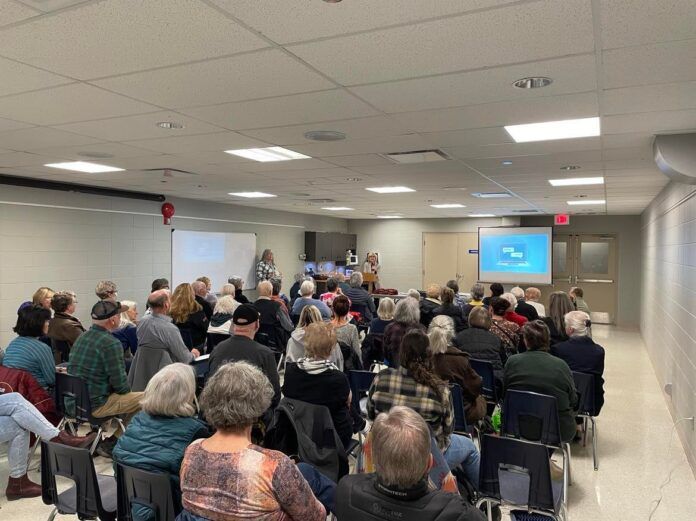In the packed Erickson Room at the Creston and District Community Complex, seniors who call the town home heard BC seniors advocate Isobel Mackenzie tell them what challenges they will face as they age.
There was not an empty seat in the room as seniors and all those who wished to attend sat patiently waiting for the meeting to start. Many brought papers, binders, and notebooks filled with questions they wanted to be answered or information they wanted to be given.
With one-third of those living in Creston being over the age of 65, Creston’s population beats out the provincial average of one in five.
Mackenzie’s presentation outlined what life will look like on average for seniors. Most seniors will live in their own homes for their entire life, will likely live with a spouse or adult child, will no longer drive at some point in their life, and most do not have a medical diagnosis of dementia.
Those aspects of life come with new challenges as a person ages, however, Mackenzie said it shouldn’t mean their quality of life should be less than a younger person.
“Everyone’s a British Columbian taxpayer and there should be equity.”
Mackenzie said with around 85 per cent of those 85 or older not living at a nursing home, there are challenges that need to be met.
“It’s a whole bunch of things, not just nursing home beds.”
Among those challenges are just how and where seniors’ income comes from after retirement. Mackenzie said seniors’ annual income should not be below $24,000 a year.
Additionally, 62 per cent of those currently working do not have a workplace pension.
Mackenzie said there is an active cost of aging that could also present issues.
Most seniors don’t have a private extended health plan. To add to that, there is no comprehensive provincial program to provide dental, eyeglasses, hearing aids, medical equipment, physiotherapy, podiatry, or mobility.
Medications can be expensive and can eat away at a senior’s income.
Housing presents another obstacle, particularly in Creston.
“The challenge in Creston is that there is nothing to rent,” said Mackenzie.
Housing is hard to find, and expensive if you do. Getting transportation to and from that housing in Creston is also difficult.
Aging will present other hurdles as well, such as access to technology, isolation and loneliness, ageism, and more.
However, in a smaller community like Creston, Mackenzie says support can be found in a town where “everyone knows each other”.
When she opened the floor to questions at the end of her presentation, there was an immediate response from the crowd.
One senior raised a concern regarding the quality of family physicians in the valley. In response, Mackenzie said the face of family medicine is changing and the province will have to rely more and more on foreign-trained doctors.
Multiple people said there was a fear of being “fired” as a patient, and even blacklisted.
“Seniors are dying right, left, and center, and not getting any help,” said one woman.
Mackenzie said she believes doctors should not fire patients but the government isn’t enforcing that currently and if there is an emergency you should go to the hospital if you can’t get to a family doctor.
When another senior then asked how they can get into contact with someone to raise concerns, Mackenzie said persistence is key: Keep trying.
Another said moving into affordable housing raises issues when a senior has a pet and that separating a senior from a furry friend is heartless.
Mackenzie remarked that some assisted living in Creston does allow pets. While challenging in assisted living, where others may have allergies or issues with the animals, the province does allow for a pet deposit when renting to encourage it. Additionally, therapy cats and dogs are options.
A man wanted clarification on why taxes were going up. He said one woman he knew was struggling to keep her house warm while still trying to feed herself.
Mackenzie said the crowd wasn’t going to like her answer. She said money needs to come from somewhere. Everyone wants a better quality of life, but that comes with a higher cost. However, Mackenzie said if you’re struggling to get by, anyone over 55 can defer their property tax.
Mackenzie ended the meeting by stating she will be presenting the information and concerns gathered by her trip through the province to health authorities and making the government aware.


